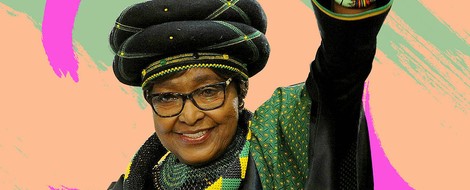Your podcast discovery platform
Curious minds select the most fascinating podcasts from around the world. Discover hand-piqd audio recommendations on your favorite topics.

piqer for: Global finds Globalization and politics
Rosebell is a multimedia communications specialist, journalist and award-winning blogger with experience in gender, peace and conflict. Currently works on public interest litigation for gender justice with focus on Latin America -Africa learning. Rosebell holds a Masters in media, peace and conflict studies from the University for Peace in Costa Rica. She is a World Economic Forum Young Global Leader.
Anti-Apartheid Icon Winnie Madikizela-Mandela's Life And Narrow Narratives Of Freedom
In the early afternoon hours of April 2, Anti-Apartheid icon Winnie Madikizela passed away at a hospital in Johannesburg, aged 81 years. Known for her defiant spirit, Mam' Winnie, also fondly called the Mother of the Nation, leaves a South Africa reflecting on the journey it has taken since the end of apartheid. And no one forces the nation to look at itself more than Madikizela-Mandela, a woman cast aside as the country strode towards reconciliation at the end of the dehumanizing system in the 1990s.
In this podcast, Eusebius McKaiser hosts historian Vashna Jagarnath to bring a more nuanced story of Winnie Madikizela-Mandela.
"Winnie was not born Mandela, she had a life before she met Nelson," says McKaiser.
Jagarnath emphasises that in writing about the past and freedom of any society, there's a tendency to flatten out history. History takes on a narrow and gendered narrative, leaving out many who wouldn't fit that narrative. "In the heroic narrative, the hero can't have complexity, and if you do, you become superfluous to that story." Mam' Winnie refused to be quieted and she paid a heavy price both under the apartheid regime and in the post-apartheid politics of South Africa.
They highlight how often Winnie's story is started from when she met Mandela. In a 45 minute podcast, the two delve into the life and times of Madikizela, who was born into a royal family. They talk about her father, who taught her to be a proud individual early in life, and her mother, the first black domestic science teacher. About her move to Johannesburg and her social work in townships that transformed her, the scholarship to a university in Boston she turns down to work in a hospital, which was "a political decision." And lastly, about how she led the struggle as many leaders were imprisoned, and her suffering, banishment and oppression.
The podcast is a brilliant conversation on what must be remembered and learned about Madikizela-Mandela. She will be laid to rest this Saturday.
